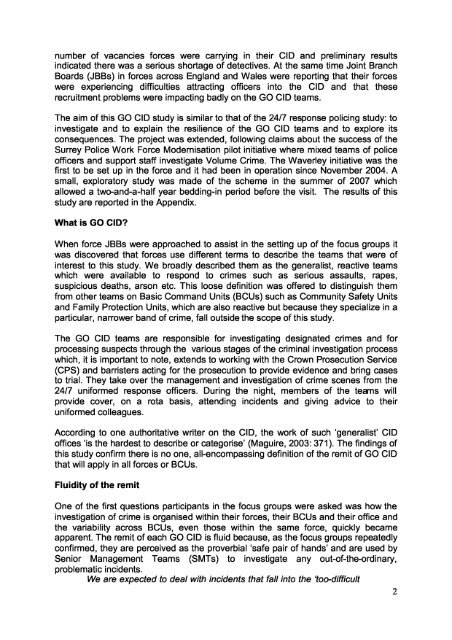LOSING THE DETECTIVES: VIEWS FROM THE ... - Police Federation
LOSING THE DETECTIVES: VIEWS FROM THE ... - Police Federation
LOSING THE DETECTIVES: VIEWS FROM THE ... - Police Federation
You also want an ePaper? Increase the reach of your titles
YUMPU automatically turns print PDFs into web optimized ePapers that Google loves.
number of vacancies forces were carrying in their CID and preliminary results<br />
indicated there was a serious shortage of detectives. At the same time Joint Branch<br />
Boards (JBBs) in forces across England and Wales were reporting that their forces<br />
were experiencing difficulties attracting officers into the CID and that these<br />
recruitment problems were impacting badly on the GO CID teams.<br />
The aim of this GO CID study is similar to that of the 24/7 response policing study: to<br />
investigate and to explain the resilience of the GO CID teams and to explore its<br />
consequences. The project was extended, following claims about the success of the<br />
Surrey <strong>Police</strong> Work Force Modernisation pilot initiative where mixed teams of police<br />
officers and support staff investigate Volume Crime. The Waverley initiative was the<br />
first to be set up in the force and it had been in operation since November 2004. A<br />
small, exploratory study was made of the scheme in the summer of 2007 which<br />
allowed a two-and-a-half year bedding-in period before the visit. The results of this<br />
study are reported in the Appendix.<br />
What is GO CID?<br />
When force JBBs were approached to assist in the setting up of the focus groups it<br />
was discovered that forces use different terms to describe the teams that were of<br />
interest to this study. We broadly described them as the generalist, reactive teams<br />
which were available to respond to crimes such as serious assaults, rapes,<br />
suspicious deaths, arson etc. This loose definition was offered to distinguish them<br />
from other teams on Basic Command Units (BCUs) such as Community Safety Units<br />
and Family Protection Units, which are also reactive but because they specialize in a<br />
particular, narrower band of crime, fall outside the scope of this study.<br />
The GO CID teams are responsible for investigating designated crimes and for<br />
processing suspects through the various stages of the criminal investigation process<br />
which, it is important to note, extends to working with the Crown Prosecution Service<br />
(CPS) and barristers acting for the prosecution to provide evidence and bring cases<br />
to trial. They take over the management and investigation of crime scenes from the<br />
24/7 uniformed response officers. During the night, members of the teams will<br />
provide cover, on a rota basis, attending incidents and giving advice to their<br />
uniformed colleagues.<br />
According to one authoritative writer on the CID, the work of such ‘generalist’ CID<br />
offices ‘is the hardest to describe or categorise’ (Maguire, 2003: 371). The findings of<br />
this study confirm there is no one, all-encompassing definition of the remit of GO CID<br />
that will apply in all forces or BCUs.<br />
Fluidity of the remit<br />
One of the first questions participants in the focus groups were asked was how the<br />
investigation of crime is organised within their forces, their BCUs and their office and<br />
the variability across BCUs, even those within the same force, quickly became<br />
apparent. The remit of each GO CID is fluid because, as the focus groups repeatedly<br />
confirmed, they are perceived as the proverbial ‘safe pair of hands’ and are used by<br />
Senior Management Teams (SMTs) to investigate any out-of-the-ordinary,<br />
problematic incidents.<br />
We are expected to deal with incidents that fall into the ‘too-difficult<br />
2
















